Reviewing and Updating Internal Learner Data
|
Page Name |
Definition Name |
Usage |
|---|---|---|
|
LM_PERSON_INT |
Review information about the learner, such as name and language code. You can also assign a preferred communication method. |
|
|
LM_PRSN_JOBDATA |
View the internal learner's HR job and employment information. View and update the assigned learning environment. |
|
|
LM_PERSON_ADDR |
Review internal learner address information. |
|
|
LM_LRNR_ATTRIBS |
Define learning preferences for the learner, such as preferred language and content delivery method. |
|
|
LM_LRN_CONTRACT |
Review and update internal learner contract information. |
Internal learners are individuals who have a record in your HR system. Enterprise Learning Management creates profiles for internal learners when you use EIPs to import person data from an HR system. (If you import data from PeopleSoft HR 8.9 and above, internal learners include employees, contingent workers, and persons of interest.)
Learner profiles store learners' contact information and preferred communication method; job and employment information; address history; and contract information. Administrators can view, but not update imported information in Enterprise Learning Management. However, after profiles are created, you can update the assigned learning environment, select the preferred communication method, and specify learning preferences (learner attributes) for each learner.
Note: Contract information on the Contracts page can be edited only if you opt to maintain contracts in ELM for the associated learning environment.
When a learner is terminated in the HR system, the learner's status is set to Inactive in Enterprise Learning Management.
Before you can view or update internal learner data, you must import the data from an HR system.
Use the Person Info (person information) page (LM_PERSON_INT) to review information about the learner, such as name and language code.
You can also assign a preferred communication method.
Navigation:
This example illustrates the fields and controls on the Person Info: Primary Learner Information page.
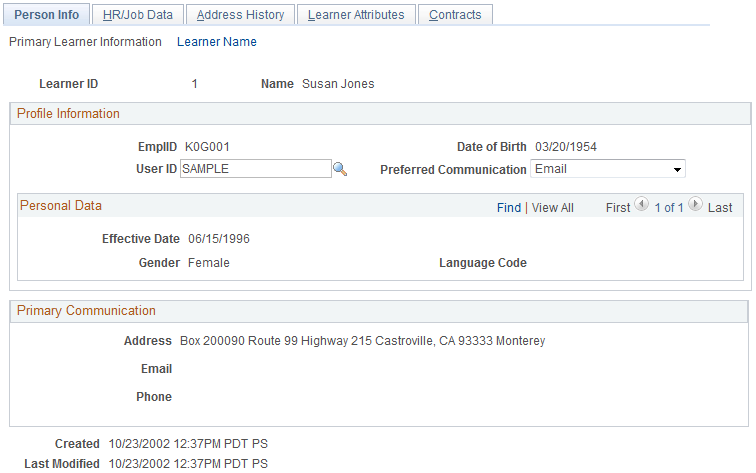
Primary Learner Information: Profile Information
Field or Control |
Description |
|---|---|
EmplID (employee ID) |
Displays the internal learner's employee ID number. |
User ID |
Displays the internal learner's user ID code. Note: During implementation, you can use delivered Datamover scripts to move user IDs between databases, such as from PeopleSoft HCM to Enterprise Learning Management. You can then activate the incremental sync USER_PROFILE message so that as new persons are added to the HR system, Enterprise Learning Management automatically retrieves the user IDs, along with the other person data. |
Preferred Communication |
Select the method of communication that the learner prefers. This is informational only. |
Primary Learner Information: Personal Data
Field or Control |
Description |
|---|---|
Effective Date |
Displays the effective date for the internal learner's gender and language code data. |
Gender |
Displays the internal learner's gender. Values are: Female, Male, and Unknown. |
Language Code |
Displays the internal learner's primary language. |
Primary Learner Information: Primary Communication
The system displays the internal learner's primary communication information, as defined on the Address History page.
Learner Name
Access the Person Info page. Click the Learner Name link.
This example illustrates the fields and controls on the Person Info: Learner Name page.
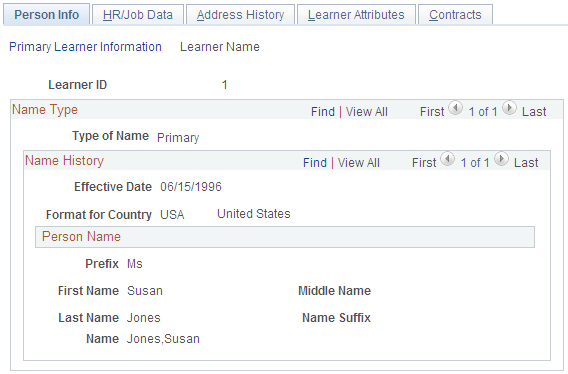
Field or Control |
Description |
|---|---|
Type of Name |
Displays the name type. See Name Types Page. |
Effective Date |
Displays the effective date for each name that is within a name type. |
Format for Country |
Displays the country format. No code is connected with this field. |
Learner Name: Person Name
The fields in the Person Name group box display the learner's name information.
Use the HR/Job Data (Human Resources Job Data) page (LM_PRSN_JOBDATA) to view the internal learner's HR job and employment information.
View and update the assigned learning environment.
Navigation:
This example illustrates the fields and controls on the HR/Job Data page.
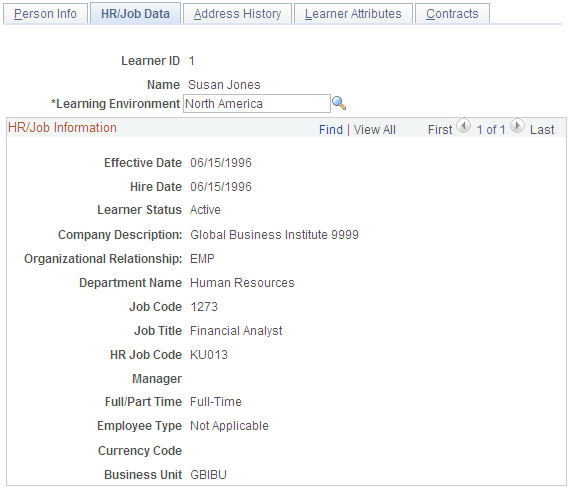
Field or Control |
Description |
|---|---|
Learner ID |
The system assigns a sequential learner ID to the user when person data is uploaded to Enterprise Learning Management. |
Learning Environment |
When you import learner data, the system assigns the learning environment that is associated with the learner's department. (If the learner has multiple jobs, the learning environment is based on the primary job.) If you import an internal learner for whom no department learning environment has been defined, the system assigns to the learner the learning environment selected on the Install Defaults - General page. See Install Defaults – General Page. Learning environments are defined on the Learning Environment - Basic Data page. Important! For users who are defined in your system as both internal learners and administrators, the learning environment on the HR/Job Data page controls the user's access as a learner, to the self-service pages. Learning environments that are assigned to the user through the Learning Environments (LM_LE_CMP) component control access to administrator tasks. The administrator can use the Set Learning Environment (LM_ADMIN) component to select the learning environment for the current Enterprise Learning Management session. |
HR/Job Information
Field or Control |
Description |
|---|---|
Effective Date |
Displays the effective date for the job. |
Hire Date |
Displays the learner's hire date for the job. |
Learner Status |
Displays the learner's job status. The system sets the value to Inactive when an individual is terminated in the HR system. |
Company Description |
Displays the learner's company, if you have imported this information from HR. |
Organizational Relationship |
Identifies the learner's relationship to the organization as it pertains to this job. Values are Employee, Contingent Worker, and Person of Interest. |
Person of Interest Type |
Displays a value only if the organizational relationship is person of interest. |
Department |
Displays the department with which the learner's job is associated in the HR system. For persons of interest without jobs, this field displays the default department that is identified on the Install Defaults page. |
Job Code |
Displays the job code for this record. When job data does not exist for a person of interest, Not Applicable is displayed here. |
Job Title and Full/Part Time |
Displays the learner's job and employment status. |
Employee Type |
Displays the learner's employee type, such as salaried or hourly. These values are defined in PeopleSoft HR and cannot be updated in Enterprise Learning Management. |
Currency Code |
Displays the currency code that is associated with this job, for this learner. This value is informational only. |
Business Unit |
Displays the HR business unit that is associated with this job, for this learner. When the learner enrolls or is enrolled by an administrator into a class that has charges, the system uses the business unit value to locate the corresponding mapped general ledger business unit. The system populates the self-service ChartField value fields (which define the department and account information to which you want to charge the class cost) by default to the values defined for the mapped general ledger business unit. If you have defined the chartfields to display during enrollment by selecting the Display check box on the Chartfield Configuration page, the default values appear to the learner or administrator and are available for edit. |
Use the Internal Learners - Address History page (LM_PERSON_ADDR) to review internal learner address information.
Navigation:
This example illustrates the fields and controls on the Internal Learners - Address History page.
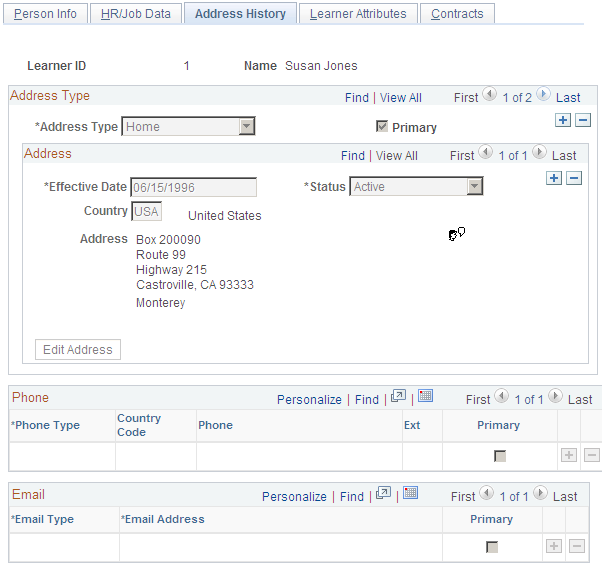
Field or Control |
Description |
|---|---|
Address Type |
Displays the address type. Address type values are defined on the Contact Method Type page. |
Primary |
Identifies an address as primary. |
Effective Date and Status |
Displays the effective date and status for the address type. |
Country |
Displays the country for the address. |
Address |
Displays the internal learner's address information. |
Phone
Field or Control |
Description |
|---|---|
Phone Type |
Displays the phone type. Phone type values are defined on the Contact Method Type page. |
Country Code |
Displays the country for the phone type. |
Phone |
Displays the phone number. |
Ext (extension) |
Displays the phone number extension, if any. |
Primary |
Identifies a phone number as primary. |
Field or Control |
Description |
|---|---|
Email Type |
Displays the email type. Email type values are defined on the Contact Method Type page. |
Email Address |
Displays the email address. |
Primary |
Identifies an email address as primary. |
Use the Internal Learners - Learner Attributes page (LM_LRNR_ATTRIBS) to define learning preferences for the learner, such as preferred language and content delivery method.
Navigation:
This example illustrates the fields and controls on the Learner Attributes page.
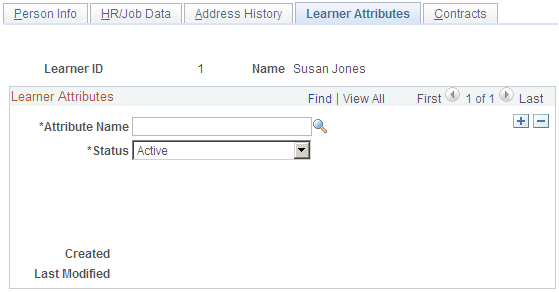
Learners can use the self-service pages to update their learning preferences.
Field or Control |
Description |
|---|---|
Attribute Name |
PeopleSoft delivers these learner attributes and their corresponding attribute values: Language Code, Preferred Delivery Method, PeopleSoft Calendar Filter, Program Type, Program Display Option, Rows Displayed, Search Attribute, and Training Region. Learner attribute names are defined on the Learner Attributes page. |
Status |
Select the status of the learner attribute for this learner. Your choices are Active and Inactive. |
Attribute Value |
Values vary by attribute:
|
Use the Internal Learners - Contracts page (LM_LRN_CONTRACT) to review and update internal learner contract information.
Navigation:
Note: This page appears in the Internal Learners component only if French features are enabled for the learning environment associated with the learner.
This example illustrates the fields and controls on the Internal Learners - Contracts page.
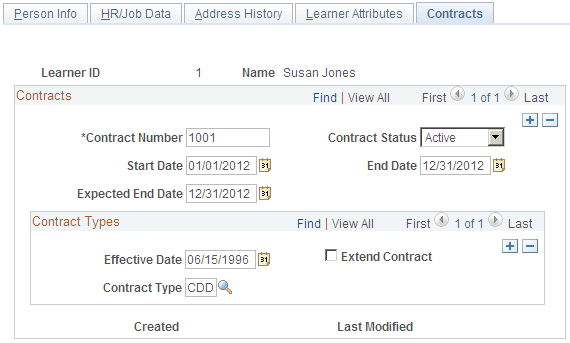
Note: You can edit the fields on this page only if the Contract Integration with HCM check box is not selected for the learner's learning environment.
See Learning Environment - Defaults Page.
Contracts
Field or Control |
Description |
|---|---|
Contract Number |
Enter the contract number. |
Contract Status |
Indicate whether the contract is Active or Inactive. |
Start Date |
Enter the date on which the contract begins. |
End Date |
Enter the date on which the contract actually ends. |
Expected End Date |
Enter the date on which you expect the contract to end. Note: This can be different from the value you enter in the End Date field. |
Contract Types
It's possible for multiple contract types to be effective within the contract period. Use the fields in this group box to enter information for each effective contract type.
Field or Control |
Description |
|---|---|
Effective Date |
Enter the date on which the contract type became effective. |
Extend Contract |
Select to indicate that the learner's original contract has been extended beyond its original date or purpose. |
Contract Type |
Select the contract type associated with the contract. You define contract types on the Contract Types page. |